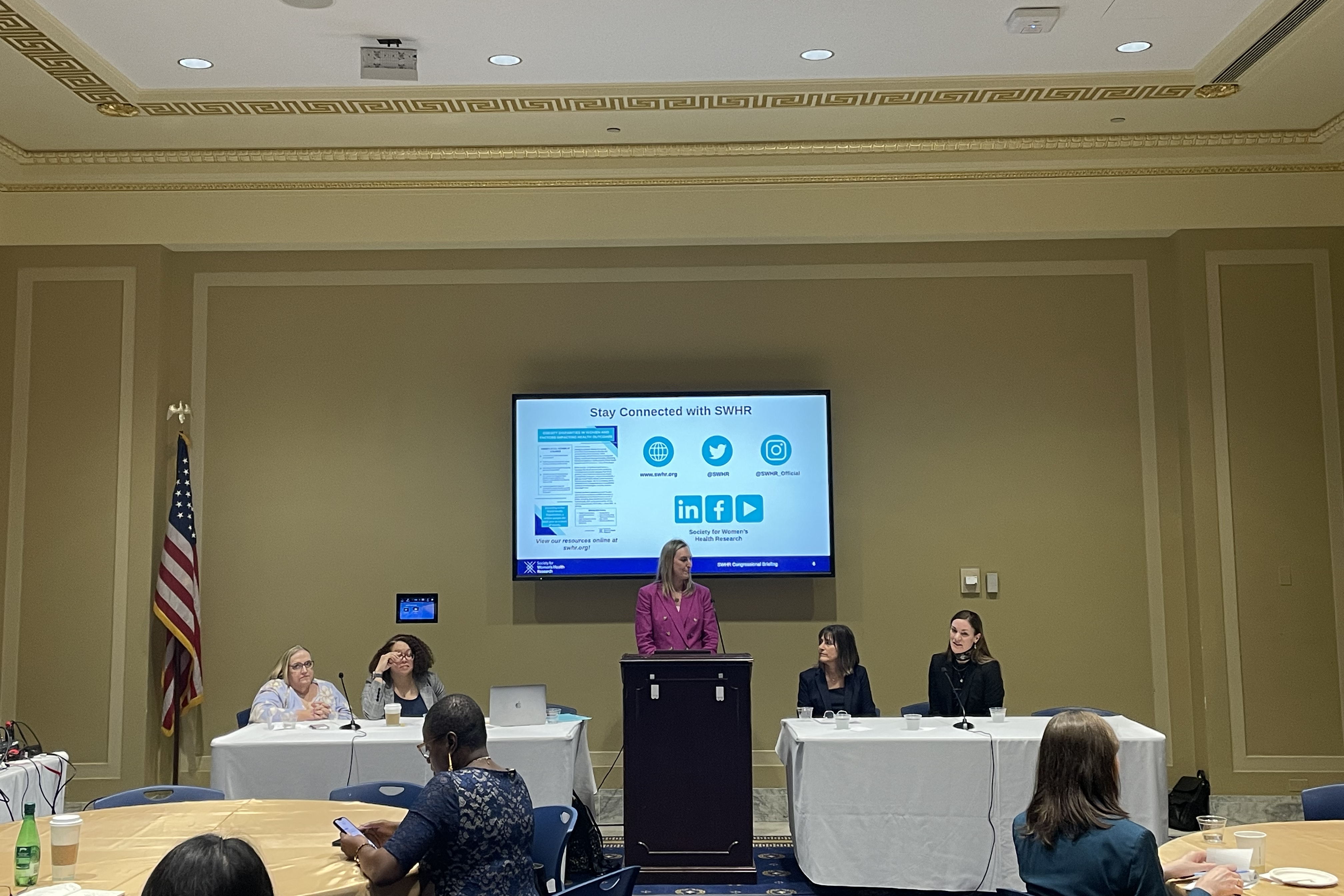By Leah Golbert, SWHR Communications Intern
On May 2, 2024, the Society for Women’s Health Research (SWHR) held a congressional briefing titled “Exploring Obesity’s Impact on Women and Policy’s Role in Improving Outcomes” at the Rayburn House Office Building in Washington D.C. During the briefing, obesity experts and women’s health advocates convened to discuss how obesity may disproportionately impact women. SWHR’s CEO Kathryn Schubert, MPP, CAE opened the event by introducing the panelists and provided brief remarks about SWHR’s work in the obesity space before turning it over to the event panelists:
- Lisa Bailey-Davis, DEd, RD, Associate Professor of Population Health Sciences at Geisinger
- Patty Nece, JD, Immediate Past Chair of the Obesity Action Coalition National Board of Directors
- Tiffany Powell-Wiley, MD, MPH, Stadtman Investigator and Chief of the Social Determinants of Obesity and Cardiovascular Risk at the National Heart, Lung, and Blood Institute at the National Insitutes of Health
- Tracy Zvenyach, PhD, Director of Policy Strategy and Alliances at the Obesity Action Coalition
“Obesity is a disease,” said Dr. Bailey-Davis. In her remarks, she focused on the fact that early childhood environments can play a significant role in obesity onset. Dr. Bailey-Davis emphasized that research shows “our youngest children 2 to 4 years of age are already showing disparities between the girls and the boys,” with younger girls seeing larger increases in severe obesity compared to boys. In addition, socioeconomic deprivation is more likely to lead to increases in BMI in children as young as age 3. Dr. Bailey-Davis recommend that obesity interventions focus on community support and the family environment, as well as the use of responsive feeding (following cues children exhibit related to hunger and satiety to improve eating behaviors and weight status). To improve obesity outcomes, “we can address the community environment and the family environment, particularly in the first 1000 days, when patterns and habits are formed,” she added.
Not only should obesity be addressed early on, but we should treat obesity with multidisciplinary care, Dr. Powell-Wiley noted. She explained that “we need to think about all of these diseases as interconnected,” referring to obesity, kidney disease, type II diabetes and cardiovascular disease. She also emphasized that living with obesity does not imply a lack of willpower. “Obesity as a disease is related to issues and functions within the brain and how that relates to food intake as well as the setpoints related to body fat,” Dr. Powell-Wiley said. She discussed policy options, such as the Food is Medicine program, housing voucher programs, and public transportation improvements as potential public health measures to tackle the obesity epidemic, alongside addressing societal weight stigma and biases. “We need to think about health equity and accessibility in obesity treatment, and how that relates to what we do in the scientific community,” Dr. Powell-Wiley said.
Next, patient advocate Ms. Nece spoke on her personal experiences living with obesity. She explained how, based on personal experience, women living with obesity often face unrealistic societal expectations, are disregarded in medical settings, and have more difficulty finding a job. These impacts, she noted, are only compounded for women who are part of a minority group. Nece also shared a personal story about putting off her mammogram for 15 years because of how uncomfortable she found the process. “People with obesity, especially women, often put off preventative screenings,” she said, due to a lack of properly sized gowns, equipment, and other system limits. This screening delay, she noted, often leads to people with obesity presenting with later disease stages. The health care system must ensure more accessible care because “health care shouldn’t come down to luck,” Nece said.
The briefing ended with a call to action from Dr. Zvenyach. She highlighted the existing coverage gaps across Medicare, Medicaid, and employer-sponsored insurance, as well as care access disparities, noting that “most beneficiaries in Medicare are women.” To support individuals living with obesity, Congress and the administration can enact federal policies that support individuals living with obesity, including examining provisions within Medicare obesity policy and passing the Treat and Reduce Obesity Act. TROA, she said, has the potential to make the full spectrum of obesity care, including medications, providers, and surgeries, more accessible for all. “Updating obesity policy will mean so much to women, it means so much to Medicare beneficiaries, and it means so much really for all Americans,” said Dr. Zvenyach.
The briefing ended with a short Q&A that included questions on some of the most critical areas of work needed in the women’s obesity space, such as clinical trial diversity, limited access to exercise resources, poor access to nutrient-dense foods, and the impact of caregiver stress – which can all contribute to the disease. Panelists agreed that incredible progress has been made in the field, and we must continue targeting innovative research questions and care solutions for women living with obesity.
“There is hope for treatment… There is hope for people with obesity now.” said Nece.
Learn more about the event and watch the event recording here!
